From a kid running wild in the Southern Flinders Ranges forests to a national radio presenter, the place Annette Marner calls home has never left her heart and now she’s immortalising it with her words and photographs.
If you have the great fortune to be in the stunning Southern Flinders Ranges and you find yourself driving behind Dr Annette Marner, she’ll most likely politely pull over to the left to let you pass.
Traversing these roads, Annette is in no rush – there are flitting birds to identify along every straight and around every bend.
The award-winning writer and fine art nature photographer treks all around the Southern Flinders to capture the area’s story through its flora and fauna, even calling the owners of private land that she’d like to explore. And when she does, the person at the other end of the phone always has the same question: “Is that Annette Marner?”
To these locals, Annette’s voice is instantly recognisable.
It’s the voice that informed them of world-shaping news events. The voice that brought them rail times and coastal reports. It’s the voice that told them insightful, heartfelt stories of their neighbours near and far.
For more than three decades, Annette, 62, was beamed into locals’ living rooms, kitchens and cars as a radio presenter with the ABC on local, state and national programs.
“I remember saying at my 50th, ‘Who knew a shy kid from the Southern Flinders whose parents never went to high school would interview the prime minister?’” Annette says.
As a girl growing up in the 1960s, Annette only had a couple of career options readily available to her. “People would ask, ‘Do you want to be a teacher or a nurse?’ But I grew up in the Catholic tradition so I had a third option available to me – a nun.”
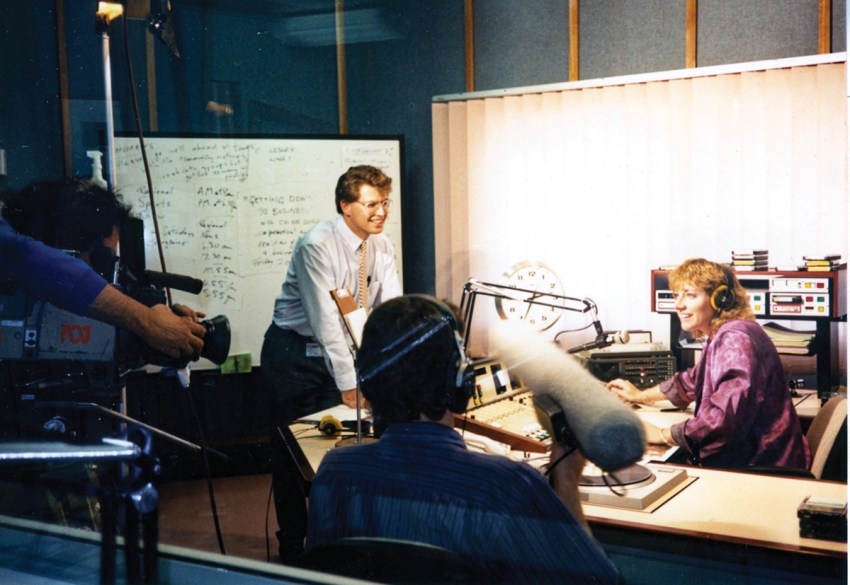
Annette didn’t end up donning a habit, nor a nurse’s whites. She considered teaching, but in her heart of hearts knew that wasn’t right for her either.
She ended up studying politics and English at Flinders University and stayed on in Adelaide during a recession – a dried up workforce left her washing dishes.
Finding herself at a crossroads, Annette returned to her very favourite spot: the top of a hill on her family’s property.
“I told my father I was coming home for the weekend and going to my favourite place on the planet and then I’ll know what to do with my life. The bushland will tell me what to do.”
Off she walked up the hill and a couple of hours at that magical spot had her seeing clearly. She had to return home to this place she loved so dearly.
At 22 years old, she left the life she was building in Adelaide and came home to live with her widowed father – her mother had died three years prior.
Annette helped around the farm, in the shearing shed and that year, wrote the first poetry she ever had published. She’s since been published in several anthologies and her own book, Women with their Faces on Fire was launched at Adelaide Writers’ Week in 2006.
But back on the farm working for her dad, she got a call out of the blue. A friend asked if she’d heard about the jobs going with the ABC at Port Pirie.
“If I’d been in Adelaide, I never would have applied. Never would I have chased that idea of being a broadcaster.”
It was the mid ’80s and there was a lack of women working in radio at the ABC, so much so that employees Elsa Atkins and Jill Lennon noticed and set up a program funded by the Hawke government to encourage more women in broadcasting.
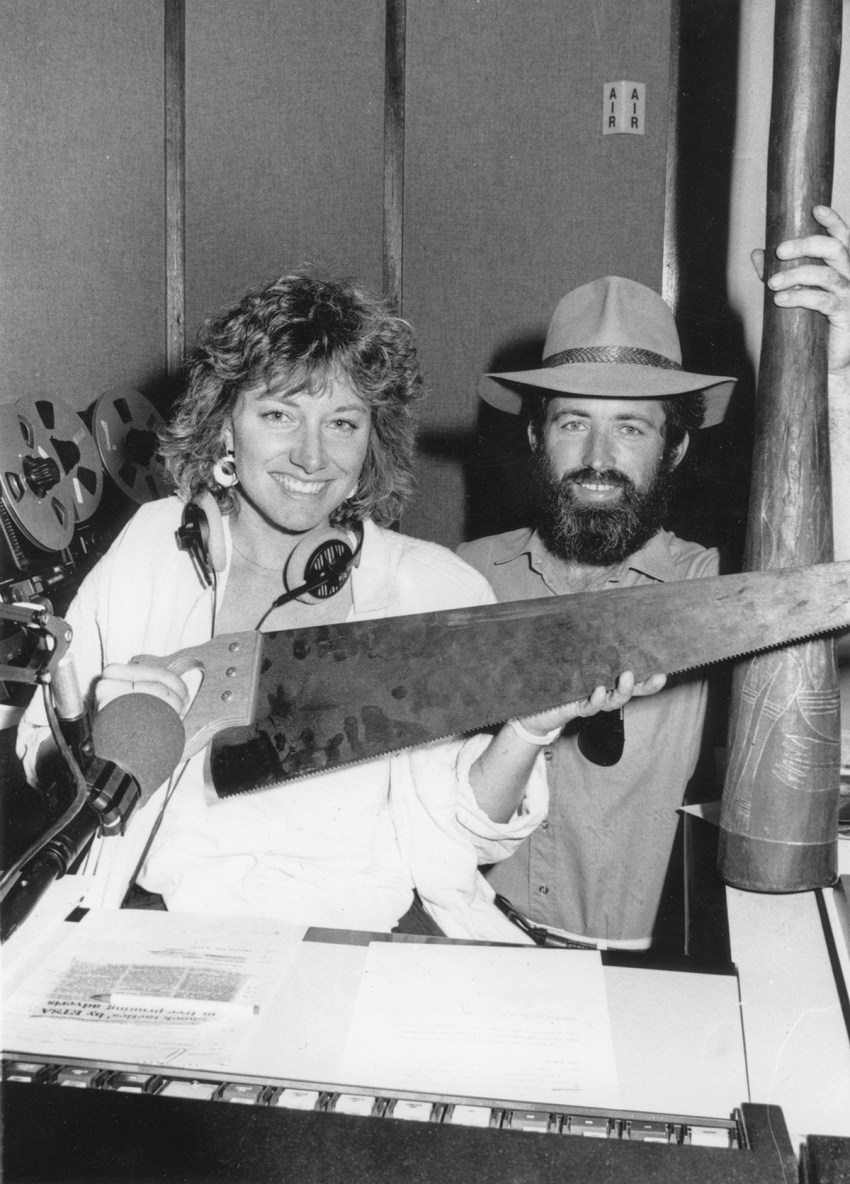
“In 1984, there were 45 positions for women created around Australia. I got one and it changed my life.”
Annette spent the next three decades hosting local, state and national current affairs programs, as well as training and mentoring ABC staff.
She has interviewed one sitting PM – Bob Hawke – and two would-be PMs in Tony Abbott and Malcolm Turnbull, and former PM Malcolm Fraser.
She was on air hosting the ABC Adelaide morning program at the Royal Adelaide Show in August, 1997 when the news came through that Princess Diana had been critically injured in a car crash in Paris.
“The extraordinary thing about radio is that within minutes, we had Mark Tamhane, our European correspondent, on the show. Television was still running a banner at the bottom of the screen but we could, and did, act immediately.
“The following week, I hosted the program the day after her funeral and people were ringing up with what she had meant to them and it’s something I’ll never forget. They wanted to express their grief and they did – in really profound, poetic ways.”
Other stories left a lasting mark on Annette. One was about a group of South African musicians she interviewed who were speaking out about the cruel system of apartheid.
“They left their family and friends and homeland in order to talk about how appalling and cruel apartheid was, knowing they could never go home and I remember being profoundly moved by their story and their bravery and that separation they must have carried with them.”
Closer to home, the month-long devastating Bangor bushfire that burned 35,000 hectares of the Southern Flinders in 2014 was personally and professionally gruelling and something that put the community spirit of the region squarely in focus.
“During the fire, there were people out in the dark creating fire breaks in the steep gullies and near clifftops, but they were out there trying to save lives.”
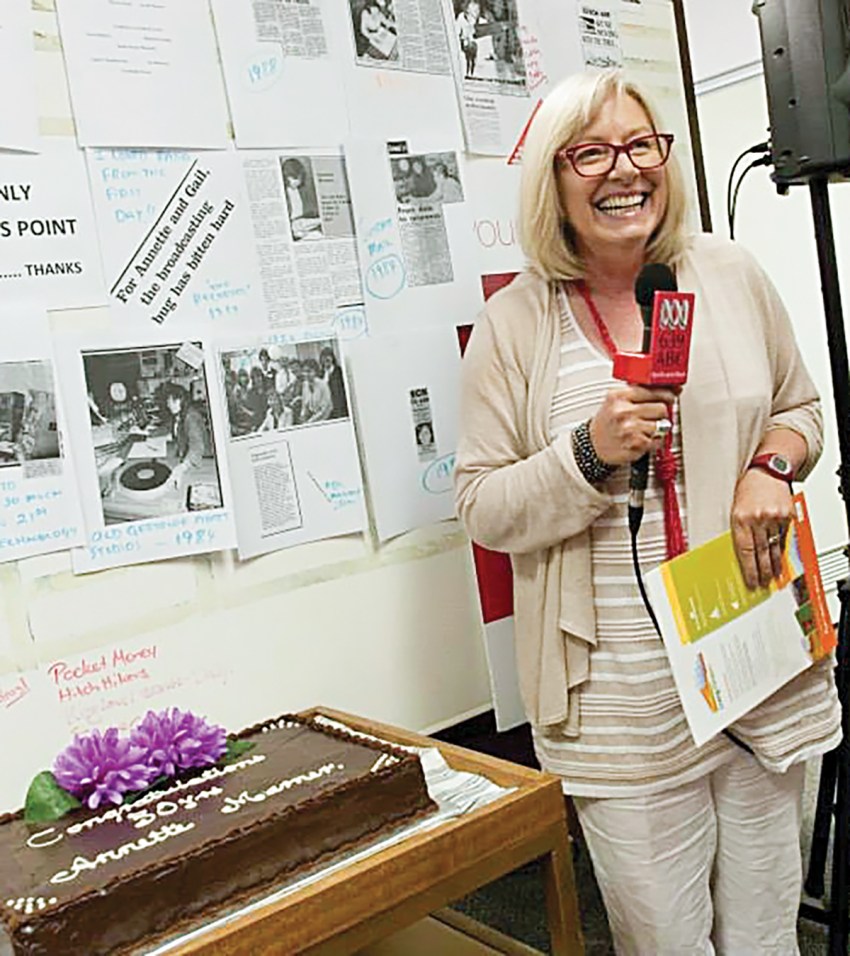
It was during the fires that Annette celebrated her 30-year anniversary of being on air. On a 43-degree day, with fires raging in the area, Annette thought, ‘Who’s going to come to celebrate this?’
In a perfect testament to Annette’s passion and dedication for the job, the Port Pirie studio was packed with about 80 people who had braved the heat to be there.
“People from all around the state sent me cards. I tracked down their phone numbers – every one of them – and phoned them to thank them.”
It’s never lost on Annette how fortunate she was to break into the industry and to have had all the opportunities she was afforded.
“That’s why I’m particularly grateful for the women who fought for the opportunity, for the young women they didn’t even know.
“There’s something extraordinarily generous about that – to fight knowing you may not win and you’re not fighting for yourself, you’re fighting for someone you don’t know. That thought is overwhelming.”
Her entry into media wasn’t one without challenge. It came with scepticism from some of the listeners – what did a woman know about politics?
Little did they know, Annette had grown up with politics being a constant discussion and she always knew it would be in her life somehow.
Annette recalls her boss, Terry Price (then regional manager of ABC North and West) calling her into his office before she went to air hosting a current affairs show.
“He said to me, ‘To be considered as good as a man, you’ll have to be twice as good’. I don’t know where this came from because it’s not the kind of thing I’d say, but out of the depths of me came, ‘That won’t be too difficult, Terry.’ Somewhere deep in the rocks of my being, I must have been ferociously determined to succeed.
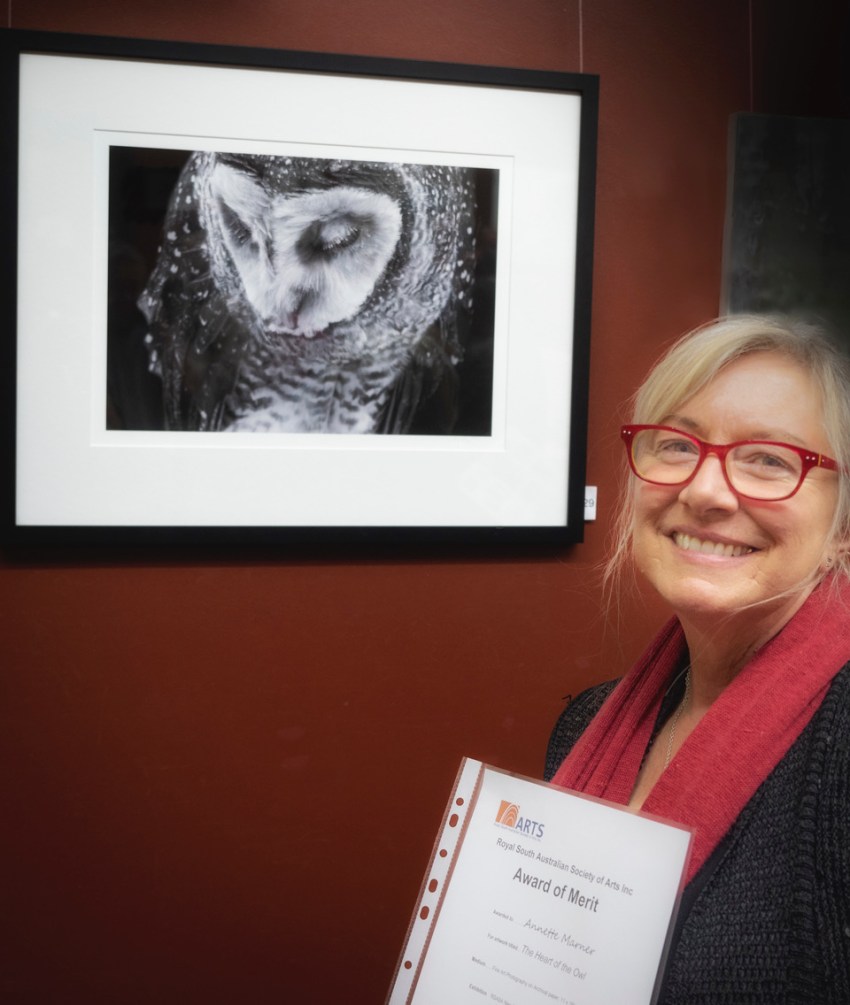
“Is it any wonder in the ’80s we women wore big shoulder pads and big hair? Shoulders are the place you look for power – even in the military they wear their power on their shoulders.”
It didn’t take long for Annette to prove herself and when federal ministers would visit the area, they certainly didn’t see her coming, often surprised she was so across national issues. The stories would end up on national ABC programs.
You truly believe it when Annette says she went to work each day for the people tuning in. She was offered television gigs over the years, but her intention stayed true.
“My number one goal was always to work for my listeners. That came before anything to do with my career or personal goals.
“It was my fundamental principle every time I went to work. I care about the people. I grew up with them and I kind of knew the things they cared about.”
One topic Annette returned to time and time again over her years was male violence towards women. It was in her first year on air that she became entrenched in the issue, spending hours interviewing victims who had fled to a women’s shelter.
“The stories they told me were of broken bones and broken hearts and I’ve never forgotten them. I made a documentary from those tapes and put it to air. I knew that one day I would write a novel incorporating the kinds of things they had told me.
“It’s so outrageous that every day women are hospitalised with broken bones and smashed up faces and bodies and that one woman a week will lose her life because a man has behaved violently. Or a child will lose their life.”
In 2018, after three decades of work on it, A New Name for the Colour Blue won the Arts SA/Wakefield Press Unpublished Manuscript Award at the Adelaide Festival Awards for Literature and was published in 2020.
The novel honours those women and far too many more like them, but it’s also Annette’s love song to her home patch.
Set in Adelaide and the Southern Flinders, the story centres around artist Cassandra Noble, who is returning to her home town after escaping it 10 years prior. To say Annette poured everything into those pages is an understatement. She wrote the lyrics for a song in the book, but it wasn’t enough that it was a pretend song on a page.
Annette offered the lyrics to recording artist Anna O. She and her colleague, Sam Wylde, brought the song to life and released it as a single.
Now that her ABC days are behind her, does Annette miss it all?
“I don’t look back. Only when I really need to reflect, but I have this life project, so my focus is on that.”
That life project is another book, one that is all-consuming. This time, it’s of the non-fiction variety, but still a love song to the Southern Flinders. One in which she will document the flora and fauna of the region.
Subscribe for updates
As she chats about the project, she’s made herself comfortable on the lounge of her little vintage caravan, affectionately dubbed Agnes.
Agnes takes Annette around the countryside while she’s photographing the region, ensuring she has everything she needs with her at any given moment.
Blue and white floral curtains inside the caravan billow in the cool late morning breeze as she tries to articulate just how much this area means to her.
“This book makes me even more humble about the fact that I can call this my home,” she says. “It’s the home of my heart. Always was, always will be. From the time I came into consciousness, I felt such a bond with this landscape and it’s never shifted.”
One of Annette’s earliest memories is of walking in the bush, seeing a male red-capped robin. “He wasn’t frightened of me. He flew in and was on a branch just a few metres away and he was singing and I thought he was the most exquisite creature I’d ever seen.”
It was here on this land – on that magical hill that fed Annette the next steps of her future – that she married her partner of 11 years.
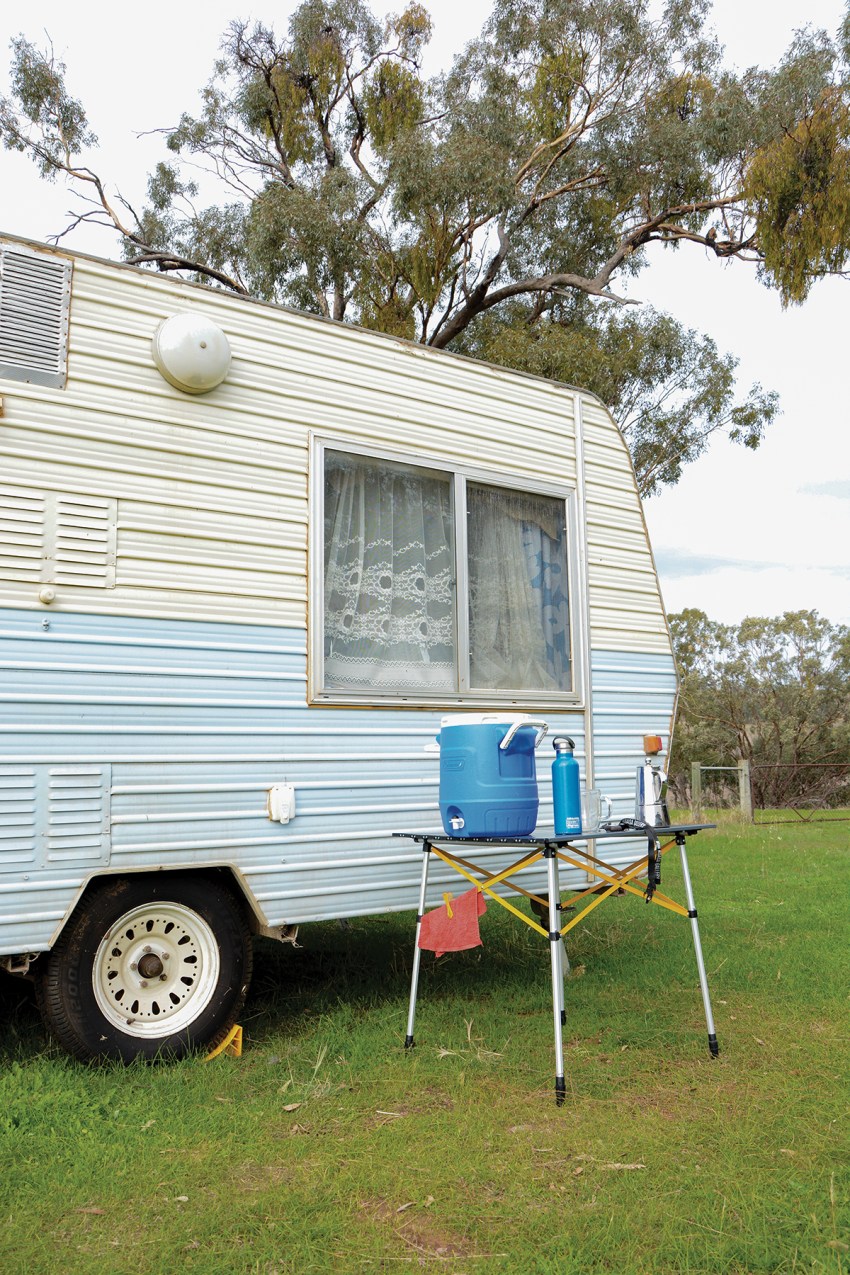
The couple met in 1998 in a writing group and they’ve now been together for 15 years, married for four.
They became engaged in 2017 the day same-sex marriage was legalised in Australia.
“She gets me, which is really nice,” Annette says.
“I grew up feeling a bit eccentric. If you know you’re gay and you don’t have the word for it and you know you want to write poetry when everyone thinks it’s a stupid thing to do.”
Annette’s history in this area is rich. Her father was a bullock driver as a young boy and his family were timber fellers. Her great-great grandfather, Robert Lucas, was the first nurseryman appointed to establish forestry at Wirrabara, which together with Jamestown, is widely considered the birthplace of forestry in Australia.
As she drives through the area she grew up in, Annette points out significant buildings from her childhood – a relative’s old house, her first school building.
Her mum’s side was a big Irish Catholic family from Georgetown, Black Rock and Peterborough. Both her mum and dad loved songs and she assumes that’s where her love of poetry began.
“They would sing whenever they’d be in the car or doing the dishes. Even as my dad was into his 80s, I was still asking him to tell me all his stories. I’d heard them hundreds of times in my life, but there was still something gorgeous about hearing that same story.”
It’s her own stories of this land that Annette is so focused on now. She tells them not only through words, but also her photographs.
She picked up a camera in 2012 when working at the ABC – she’d been asked to put up a social media post each day and she decided to do it in the form of beautiful images of landscapes, wildlife and birds in the region.
The praise rolled in, as did questions about when she’d be holding an exhibition. She eventually did it in 2017 at the Port Pirie Gallery, where her former on-air sparring partner Peter Goers opened the show.

“I talked to him five days a week on air for 10 years and I used to joke that it added up to three full days of my life I can never get back.
“We had such a wonderful relationship on air and to this day when I’m out and about, people say, ‘You’re Annette Marner, you’re the one who used to razz up Peter Goers’.”
Through her lens, Annette painstakingly – in bad yoga poses, as she describes them – explores every angle of a plant.
Earlier this year, she won a Solar Art Prize award for her photograph entitled Sisters Holding on by a Thread of the critically endangered spiny daisy. It took her eight hours over two days to get the shot she was happy with.
With fauna, she plays a similar waiting game. She’s never been one to go out and hunt a shot. She’s far more subtle about it.
“I learnt at five or six years old that you never know who might come along if you’re just sitting in the bush.
“I don’t go out hunting, I go out with a curious mind – who might I meet today?
“The wild world gives us so much at a deep level that money can’t buy and that is available to everyone if you immerse yourself in it. That is the natural world’s incredible generous gift to us.”
Annette takes SALIFE trekking across some of the Southern Flinders bushland. As we wander along, Annette’s train of thought is interrupted by a gorgeous, brave butterfly that perches on a twig on the ground. His wings are outstretched and it’s all-encompassing to Annette for those few minutes.
She treads lightly so she doesn’t startle him as she tries to get the shot, but she has nothing to worry about, he’s settled in comfortably.
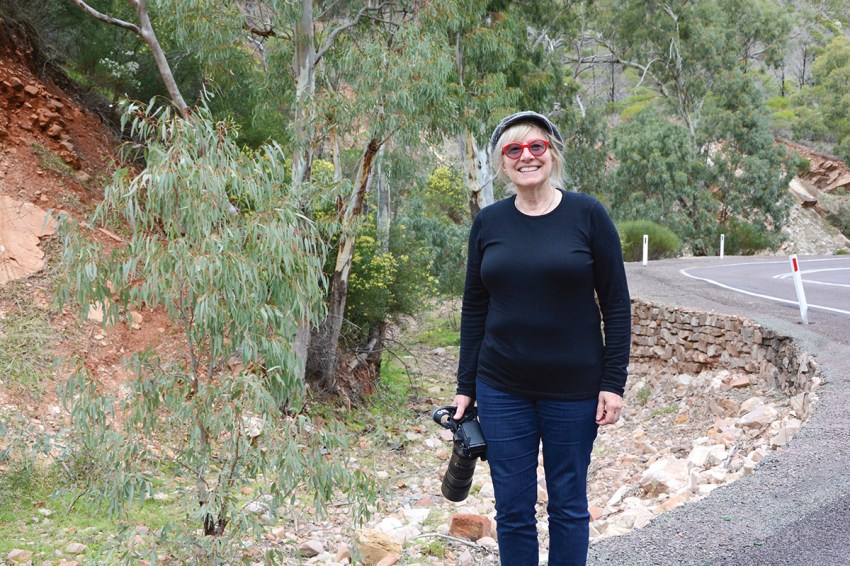
As we go along both on foot and by car, the distant tweet of a bird continuously stops her. Annette reels off their species impressively as they dash by in a blink.
The waiting game often pays off for Annette, who manages to capture the detailed beauty and personality of the creatures in her lens. Now, we’re driving through Port Germein Gorge, neon yellow flashes in the window as the Flinders Range wattle is beginning to explode from the branches growing out the side of the rock face.
She’s stopped at the end of the gorge, pivoting on the spot as she points out all the things she can see.
“There’s the ocean.” Turn. “There’s the incredible gorge.” Turn again. “And through there, you can see Port Pirie.”
There’s unfiltered pride all over her face and in her energy as she’s doing what she loves most – showing off her patch.
Annette glances out the window at this place she’s seen a million times, looking at it as though it’s the first time she’s laid eyes on it.
“It has this gentle magic about it.”
This article first appeared in the June 2023 issue of SALIFE magazine.





